The Gift of South Dakota
Subscriptions to South Dakota Magazine make great gifts!
Subscribe today — 1 year (6 issues) is just $29!
Let’s Go Shopping in Scotland
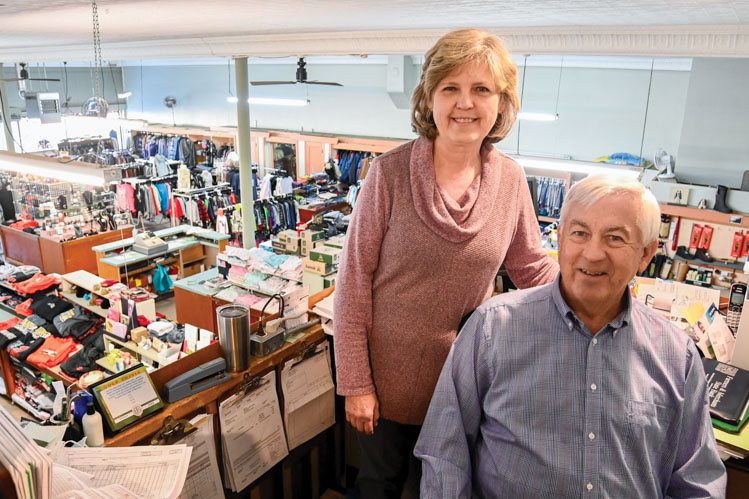 |
| Dean and Karen Rettedal's department store in Scotland features apparel for men, women and children, though Dean says women's clothing is most popular. "The men will wear something three or four years or until it wears out, but fortunately the women want something new now and then." |
Ludwig and Donna Rettedal arrived in Scotland to run a shoe store in 1959. Within three years, Walmart, Kmart, and Shopko pioneered big-box stores and suddenly it seemed that small town retailers were an endangered species.
Nobody told the Rettedals.
“I was in the fourth grade when we moved here from Winner,” Dean Rettedal says. “It was in the spring of the year and all the Scotland boys went out after school and played baseball.” Before long, he was playing first base.
Dean’s dad was an avid golfer in Winner. “There was no course here in Scotland, so he and some friends went around and sold shares and started the golf course.”
Dean and his four brothers fished for bullhead and bluegill in Lake Henry. He mowed lawns for spending money and was inspired to play the trumpet by music teacher Len Vellek. The latter was life changing.
Dean majored in music at the University of South Dakota. When he needed an accompanist for his junior-year solo trumpet recital, someone suggested Karen Twite, a Beresford freshman. They married in 1971 and both taught at Centerville and Emmettsburg, Iowa, but Dean didn’t forget his happy childhood in Scotland.
In 1979, he and Karen bought the department store where his father had the shoe store. Incidentally, 1979 is also when Texas Instruments debuted a personal computer that would soon make it possible for people to shop from home. Amazon took advantage of the technology in 1994 and before long many of the big box stores were slumping.
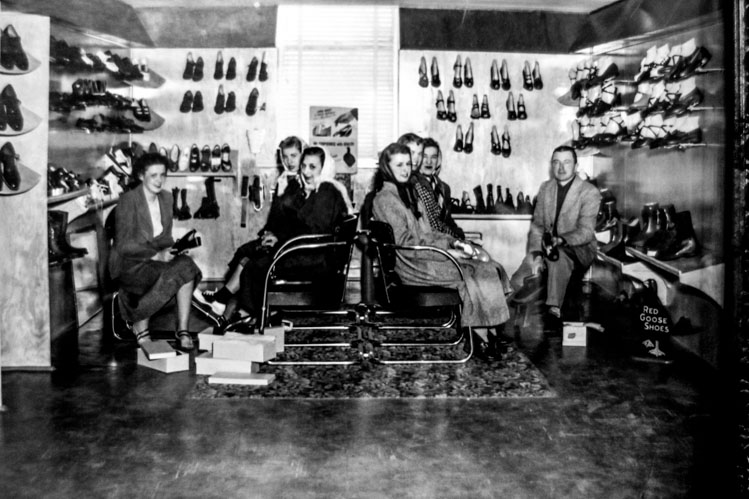 |
| Ludwig and Donna Rettedal came to Scotland with their young family in 1959 to run a shoe store in the town's department store. |
Only two JCPenney stores survive in all of South Dakota and there are now just three Kmart stores in the entire United States. Amazon is the world’s biggest retailer worldwide. But Rettedal’s Department Store is king in Scotland. It continues to exist as 4,000 square feet of calm and charm, aisles of gentility that seem very different from today’s often overhyped, overpriced and underwhelming commercial shopping experience.
Dean and Karen Rettedal only shrug and smile when asked about the contrast with the corporate culture. “We do have people who come in and say it’s nice to have somewhere to shop other than a big mall,” Dean acknowledges.
“We have a lot of loyal customers who have also become good friends,” nods Karen.
Understatements, if you ask around town. Mike Behl has a good view of the Rettedal Store. He works across the street at Farmers and Merchants State Bank, his family’s vocation since his grandfather came to town in 1938.
“Dean and Karen have a market that fits the people of Scotland,” Behl says. “And people come from all over the area. You see cars from everywhere. You can see that people like them, and they just like to shop there.”
The young banker says it is a godsend for the men, especially. “If you find you have to go to a funeral or a wedding and you need a nice shirt, you go see Dean.”
Rettedal’s has clothing for men, women and children, along with toys and books, greeting cards and a shoe department that looks exactly like it did when the family came to town in 1959. The same six steel chairs still await customers, though Dean reupholstered them a few years ago.
Behl, the banker, says having a beloved cornerstone store helps the entire town. He points up and down the street to a flower shop, coffee shop, hardware store, grocery store, four-lane bowling alley and several eateries that all benefit when out-of-towners arrive.
The neighboring stores also have their charms and niches. Jake and Valerie Sturges stock the usual tools, paints and plumbing supplies that you expect at Scotland Hardware, but they also offer Valerie’s handcrafted gift items and a big section of fishing tackle for anglers at Lake Henry.
“We also have a lot of the small appliances like coffee pots,” says Valerie. “It’s an emergency in town if someone’s coffee pot goes out first thing in the morning.”
Ron’s Market, just a block off Main Street, stocks the basic food items, along with local treats like Amish candies, Dimock Cheese, chislic from Kaylor Locker and eggs from a local Hutterite colony.
Scotland Locker, the town’s popular butcher shop, is best-known for flavored brats. Favorites include a breakfast brat stuffed with hash browns and cheddar cheese, as well as a hot brat known as Napalm in the AM.
Dean Rettedal says Scotland had more stores in the 1960s when he was a child. “We had three cafes, two hardware stores, two grocery stores. Fortunately, we still have all those services, but they are just not doubled up today.”
In the town’s early years, it even had two main streets. The town was founded in 1870 on Dawson Creek by C.T. Campbell, a Civil War soldier from Pennsylvania who nearly died from battle injuries. Though badly crippled, he recovered enough to return to the fighting and served with distinction. Reassigned to Dakota Territory after the war, he was drawn to the beauty of Dawson Creek and chose it as his townsite.
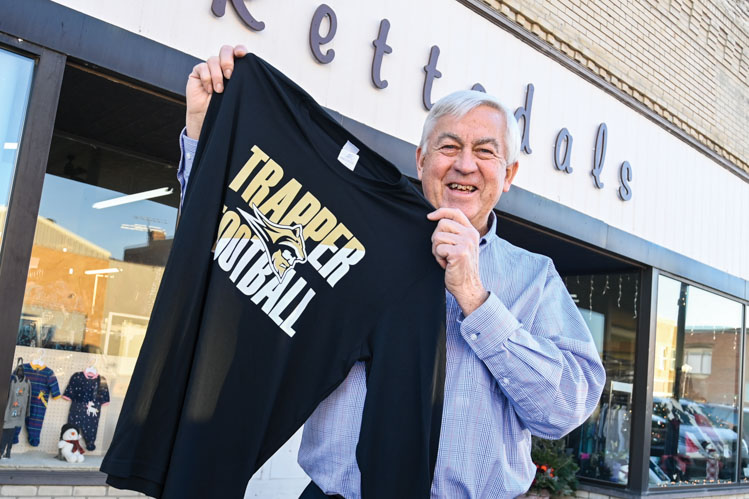 |
| When the Menno Wolves and Scotland Highlanders merged their football programs, their gridiron name became the Trappers. Dean Rettedal shows off the mascot, a highlander with a wolf head hat. |
Campbell helped Scotlanders relocate to the present site in 1881 when the railroad arrived. In its early years, the town had two shopping districts because of language barriers between Germans from Russia and other settlers. The former group built stores along Currie Street (now Curry Street), which still intersects Main Street on the west side of town. However, as immigrant families became more acclimated to the English language and American culture, Main Street dominated. Today it still features pioneer brick architecture, though some of the handsome structures need repair.
Fortunately, the Rettedal Department Store looks much as it did in 1929 when JCPenney leased the space. Dean has a deed for the property that shows the terms: $1,500 per year plus 2 percent of gross sales over $90,000.
The store still has the same high tin ceiling and big wood door. Greeting card racks are where they were in the 1950s but gone is the mechanical cash carrier that carried customers’ payments and receipts to an upstairs office.
When the Rettedals bought the store in 1979, Karen ran it full-time while Dean split his days between the store and a part-time role as a music teacher and band director at Mount Marty University in Yankton.
“When I retired from Mount Marty in 2015, friends asked me what I was going to do with all my time,” laughs Dean. “I said I was going to just work six days a week.”
On summer mornings, he rises early and visits the golf course his father helped to start. “I go out for about 20 minutes and walk as fast as I can go,” he grins. Then he heads for the store.
He serves as treasurer for the Scotland Chamber of Commerce, a job he’s held for 40 years. Karen directs the church choir and Dean still plays trumpet for the Yankton Summer Band and the Sioux Empire Brass. They visit their children, Kristi and David, who live in Sioux Falls and Dakota Dunes, respectively. They also travel “to market” at Minneapolis several times a year to shop for inventory. But most of their days are spent together in their store aisles, along with Vickie Fillaus and Marlys Haase, two longtime co-workers.
Dean, a man of few words, describes a good day at the store like this: “You’re busy. People are happy. You have what they want.”
He doesn’t need to say that working alongside Karen, in the same space that attracted his parents to Scotland in 1959, is something he cherishes. It’s apparent to every visitor who walks through the old wood door.
“We are retirement age I guess, but it’s a great life for us,” Karen says. “It’s a big commitment so you have to enjoy it, but we do. I don’t know what we’d do all day if we didn’t have the store. If someone came in and said, ‘We want to buy it,’ I guess we’d have to think about it a little harder ….”
Obviously, Karen has no enthusiasm for selling. She didn’t even finish the sentence, and Dean acted as if he wasn’t listening to such talk. That’s good news for Scotland’s remaining Main Street.
Editor’s Note: This story is revised from the March/April 2023 issue of South Dakota Magazine. To order a copy or to subscribe, call (800) 456-5117.


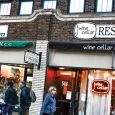




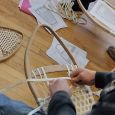
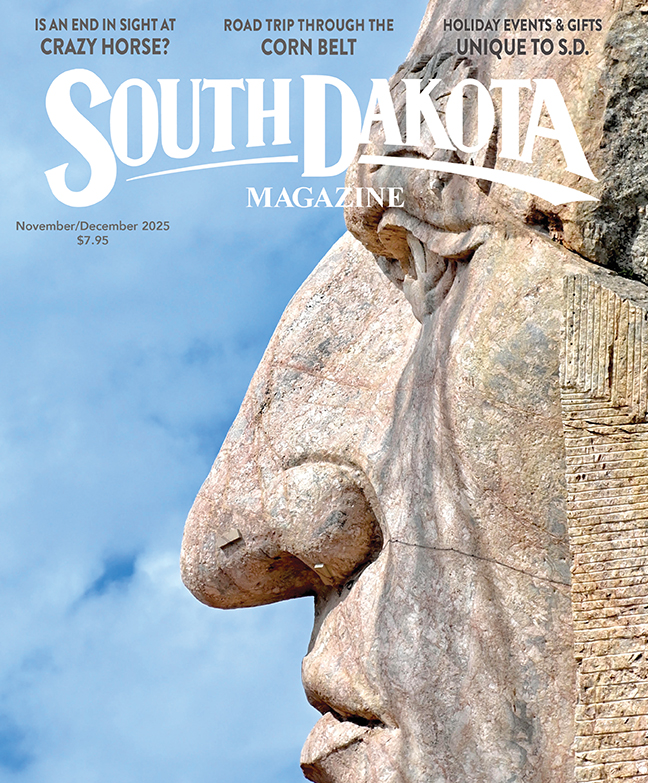

Comments